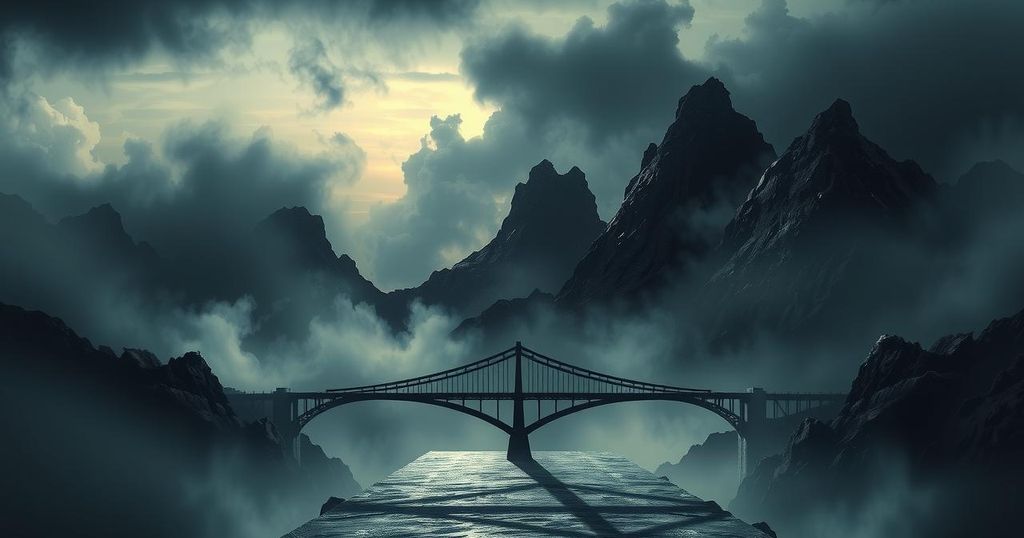Rwanda-backed rebels have seized Goma, a key city in the eastern Democratic Republic of Congo, resulting in mass casualties and displacements. Congolese officials condemned this act as a violation of sovereignty, while calls for an immediate ceasefire have intensified amid escalating violence and humanitarian distress on the ground.
On Wednesday, an armed rebel group supported by Rwanda took control of Goma, a significant city in the eastern Democratic Republic of Congo, after days of intense fighting. This takeover has resulted in numerous fatalities and displaced thousands, leaving the city in chaos. The loss of Goma marks a major defeat for the Congolese government and escalates tensions with Rwanda, igniting fears of a broader regional conflict.
Congolese Foreign Minister Thérèse Kayikwamba Wagner condemned the Rwandan incursion as a breach of sovereignty, calling for the immediate withdrawal of Rwandan forces. Thousands remain trapped in Goma, facing severe shortages of essential resources such as food, water, and medical care. Wagner highlighted the dire humanitarian situation, emphasizing the urgent need for security and aid.
Rwanda has attributed the recent violence to the Congolese military, accusing them of breaching a previous ceasefire agreement. Moreover, Rwandan officials allege that Kinshasa is supporting groups linked to the 1994 genocide. Responses from the Rwandan authorities have not been made public at this time.
In light of the escalating situation, U.S. Ambassador Dorothy Shea addressed the U.N. Security Council, denouncing the capture of Goma and advocating for an immediate ceasefire. Her call for peace coincided with similar appeals from other nations, including Kenya, France, and Britain, yet little progress toward resolution has occurred.
Additionally, U.S. Secretary of State Marco Rubio expressed concern regarding the actions of the Rwandan-backed M23 group in discussions with leadership from both Congo and Rwanda. Rwandan President Paul Kagame described the conversation with Rubio as constructive, emphasizing the importance of resolving the underlying issues of the conflict.
Incidents of violence have led to a surge in hospital admissions in Goma. The United Nations reports that approximately 300,000 individuals were displaced in the vicinity due to the conflict. Residents recount harrowing scenes of violence and desperation as basic necessities are increasingly scarce.
Witnesses such as Espoir Ngalukiye describe the pervasive presence of M23 fighters in Goma and the perilous conditions that civilians face. Ngalukiye reported that access to clean water has become extraordinarily difficult, with communities resorting to unhealthy alternatives.
Many families, including those of individuals like Kirenga Tantine, are fleeing Goma, often heading towards Rwanda for safety. The humanitarian situation has deteriorated, with claims of hospitals being targeted amidst heavy shelling.
The M23 group, primarily consisting of the Congolese Tutsi community, previously seized Goma in 2012 but withdrew under international pressure. The ongoing conflict is deeply rooted in the region’s wealth of minerals, which has for years fueled violence and instability.
The involvement of various armed forces from surrounding countries poses a further risk of escalation. Reports indicate that Burundi has previously deployed troops to assist Congolese forces, while allegations of covert support for M23 from Uganda have circulated. Additionally, an Islamic State affiliate is known to operate within the region, complicating the security landscape.
The conflict in the Democratic Republic of Congo, particularly in its eastern provinces, is characterized by a complex interplay of regional politics, ethnic tensions, and the quest for control over rich mineral resources. Historically, Rwanda has been involved with armed groups in the region, including the M23, which has contributed to periodic escalations in violence. The control of Goma is significant not only for its strategic value but also for its humanitarian impact on the population amid ongoing violence.
The capture of Goma by Rwandan-backed rebels represents a critical juncture in the ongoing conflict in the Democratic Republic of Congo, exacerbating an already volatile humanitarian crisis and military standoff. The escalation of violence not only threatens regional stability but also highlights the urgent need for international intervention and a diplomatic resolution to the underlying issues fueling the conflict.
Original Source: www.washingtonpost.com






